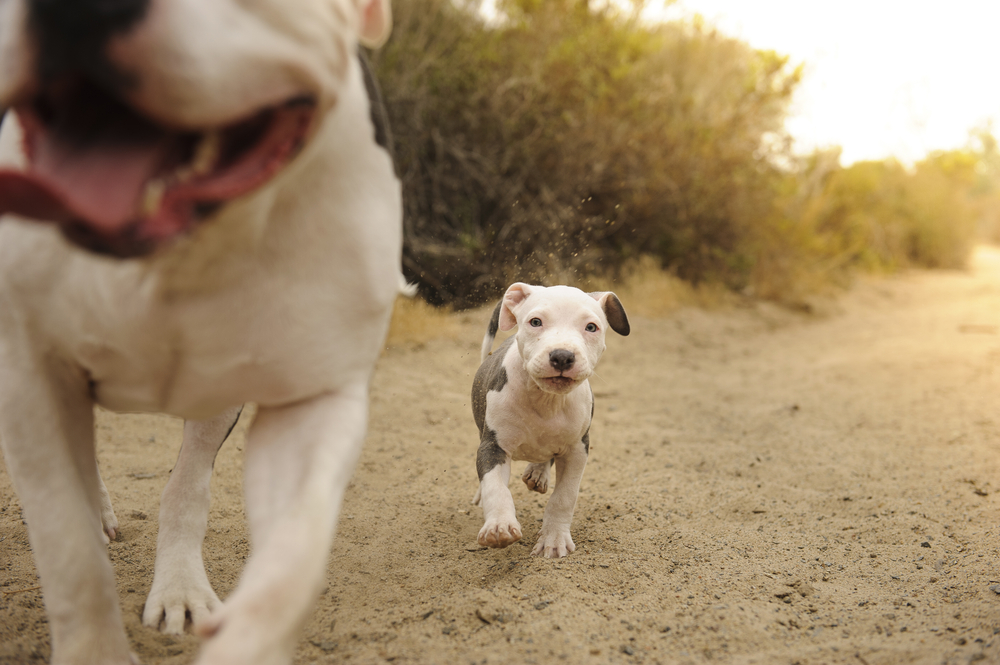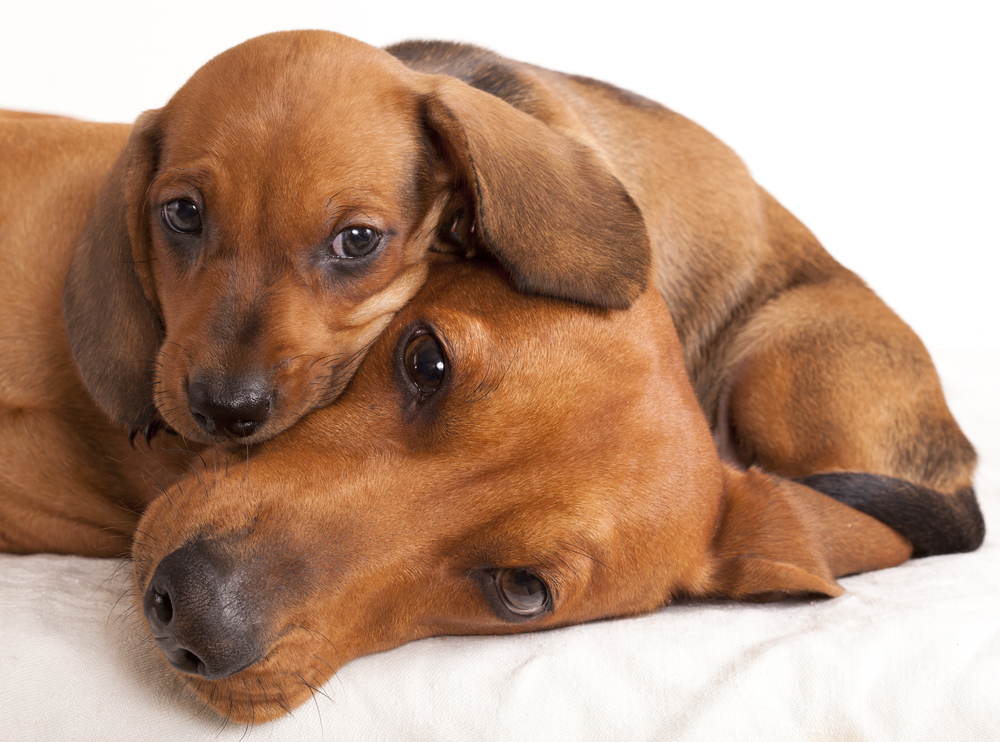
We can’t exactly ask if a male dog knows who their puppies are. Therefore, it’s hard to answer this with tons of certainty. However, based on what we do know, male dogs don’t generally recognize their puppies. They lack parental instincts, which means that they don’t participate in the care or rearing of their puppies.
For this reason, there is a good chance they just don’t know who their puppies are! There is also the possibility that they do know who their puppies are, but they may not express any parental instincts.
Let’s take a deeper look at why male dogs (probably) don’t know their puppies.
Why Don’t Male Dogs Know Their Puppies?
Again, this sort of behavior is very hard to study. However, there are a few possibilities that might explain a male dog’s lack of instincts:
- Evolution: Despite what some dog food advertisements claim, dogs are not wolves. They’ve been domesticated for thousands of years. In that time, they’ve evolved next to people to be pretty different from their wolf ancestors. For instance, humans have taken over the responsibility of providing food and shelter, while dogs often perform more niche roles. Therefore, male dogs don’t need to contribute to a litter’s success, as there are typically several humans doing so.
- Limited Interaction: In the modern world, male dogs are not often around the mother during the birthing process and during the early weeks. This lack of bonding time may help contribute to their lack of parental instincts later. However, male dogs can exhibit jealousy and may accidentally injure the puppies. Therefore, there is a good reason most breeders do not allow the male dog around during these early weeks.
That said, none of these reasons mean that a male dog won’t exhibit any affection towards puppies. In many cases, they may be playful towards puppies, but this doesn’t necessarily mean that they know the puppies are their puppies. A well-socialized dog is more likely to exhibit good social skills around puppies.
Many male dogs are very good with puppies and can help socialize them at an early age. However, it’s important to supervise any interaction between a male dog and new puppies to ensure safety. Otherwise, accidents can occur.

Do Male Dogs Know When Their Puppies Are Born?
Most modern breeders separate pregnant females from other dogs when they are in labor and for the weeks following birth. This time is very sensitive for both the female and puppies, so the presence of other dogs often does more harm than good.
Furthermore, unlike humans who understand pregnancy stages, dogs rely solely on instincts and physical cues. There is no way for a male dog to recognize that the female is in labor unless the male dog is with the female. Plus, even if the male was with the female, there is a good chance he would not know what was going on.
(Like many humans, the distress of the female may even frighten him.)
The female dog will typically exhibit behavioral changes before giving birth, but we don’t know if the male dog picks up on these. Pheromones may also be present, but no research has shown that males respond to these hormones in any particular way.
Of course, there are some cues that the male may pick up on that make it pretty clear a litter of puppies has been born. For instance, if he hears and sees the puppies, then he’ll obviously know that the puppies are there.
Do Male Dogs Get Attached to Puppies?
Male dogs don’t generally form attachments to their puppies the way humans do. They don’t have strong parental instincts, so they don’t attempt to care for or protect the puppies in any way. However, this doesn’t mean they can’t develop a bond with the puppies the same way they bond with any other dog.
Many dogs like puppies, for instance. They may be particularly gentle, which may stem from an older instinct. However, this doesn’t mean that the male dog is particularly attached to puppies. Some male dogs may try to play with the puppies, as well, especially as they become older and more energetic.
Some male dogs just don’t get along well with puppies. Sometimes, the puppies may be too energetic and “annoying.” Other times, the male dog may become jealous of the attention the puppies are getting.
Either way, it’s important to supervise closely, even if the interaction seems to be going well. Puppies can quickly become injured by larger dogs. Puppies also don’t have very good social skills and may be unable to get away if the interaction turns sour.
If you want your male dog to interact well with puppies, socialization and training are important. Don’t assume everything will go well just because the puppies are genetically related to the dog. Often, that doesn’t mean much when it comes to interactions.

How Do Male Dogs React to Puppies?
Male dogs can react to puppies in tons of different ways. Again, it depends a lot on a dog’s personality. Here’s a quick breakdown of some potential possibilities:
- Curiosity and Playfulness: This is a frequent reaction. Most of the time, dogs will be playful and curious around puppies. They often sniff them and try to “figure them out.” If the puppies are playful and energetic, they often feed off the older dogs, causing them to become more energetic and playful, too. It’s important to remember that puppies cannot tolerate rough play, though.
- Neutrality: Some male dogs don’t react in any particular way. They may ignore the puppies, potentially even leaving the area if the puppies start trying to interact. In this case, it’s important not to force interaction.
- Jealousy: Sometimes, male dogs may not like puppies. Male dogs can become possessive, and some don’t understand that puppies are puppies. They may think puppies are trying to steal their resources, like toys or food.
- Anxiety: Many dogs get anxiety around puppies. They’re unpredictable and have very poor social skills. Many dogs just don’t know what to do with them! Lots of puppies may overwhelm an older dog quickly, especially if he isn’t well-socialized with puppies when younger. Watch for signs of anxiety and remove the older dog if he seems to be anxious.
Very young puppies tend to trigger a nurturing response in other dogs, including some males. In many cases, males just know to be gentle with puppies. However, as puppies get older and more energetic, play becomes the primary interaction.

Final Thoughts
There isn’t any evidence that male dogs know when puppies are genetically related to them. Therefore, it’s very likely that male dogs just see puppies as puppies, not necessarily their puppies.
How male dogs interact with puppies depends on the exact dog and situation. Sometimes, male dogs may be nurturing and gentle with puppies. They may play with older puppies well. Other times, they may be worried about resource competition, anxious, or fearful. Socialization can help older dogs get along with puppies, but there is still a big individual variance.
Featured Image Credit: WilleeCole Photography, Shutterstock

